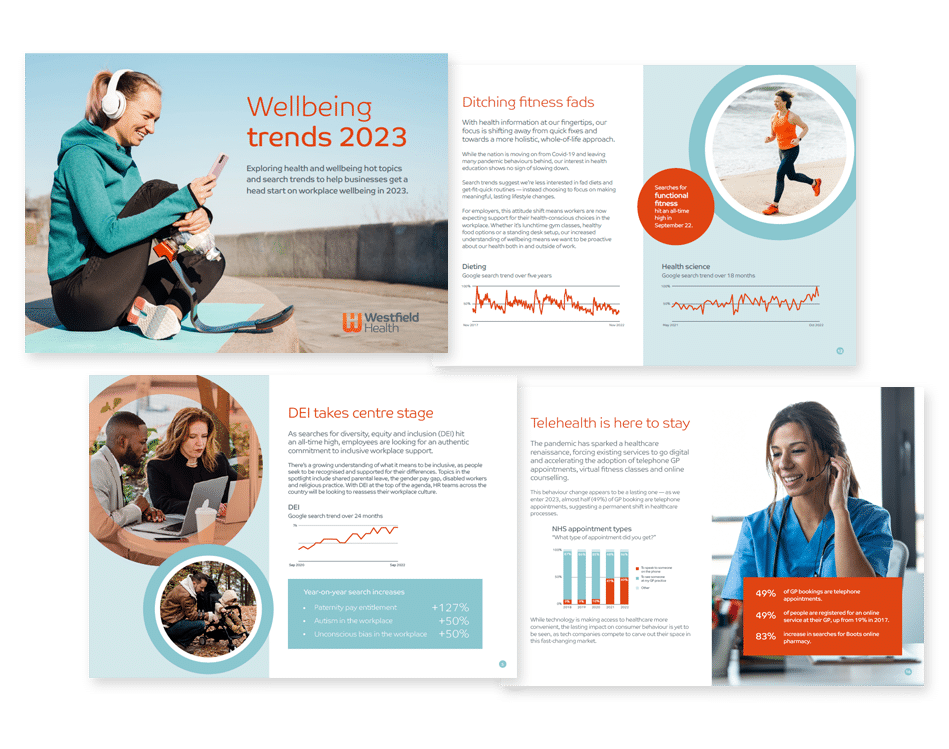In our 2023 Wellbeing Trends report, we explore the most-searched health and wellbeing topics and how they’ll impact businesses in the coming year.
One rising theme is health education, as people look to proactively support their own wellbeing in the wake of the Covid-19 pandemic. With health at the forefront of our minds, the public are becoming better informed — but also more anxious to prevent health issues as pressure on the NHS continues to grow.
Key findings from the report:
- Searches for ‘functional fitness’ are at an all-time high.
- ‘Health science’ saw a surge in interest in 2022.
- Searches for ‘NHS waiting times’ have more than doubled since the start of 2020.
- 39% of NHS patients referred by a consultant had not received treatment within 18 weeks.
- Standing desks continue to be popular as people look to prevent back pain while working remotely.
- Searches for ‘private medical insurance’ are on the rise.
Ditching fitness fads
With health information at our fingertips, our focus is shifting away from quick fixes and towards a more holistic, whole-of-life approach.
While the nation is moving on from Covid-19 and leaving many pandemic behaviours behind, our interest in health education shows no sign of slowing down.

Search trends suggest we’re less interested in fad diets and get-fit-quick routines — instead choosing to focus on making meaningful, lasting lifestyle changes.
For employers, this attitude shift means workers are now expecting support for their health-conscious choices in the workplace. Whether it’s lunchtime gym classes, healthy food options or a standing desk setup, our increased understanding of wellbeing means we want to be proactive about our health both in and outside of work.
Prioritising peace of mind
With the aftermath of the pandemic comes an increased worry about how we can support our future health. Google searches for ‘NHS waiting times’ continue to rise, fuelling anxiety around access to healthcare in the UK.
This lack of trust in the NHS is now driving people to put their own preventative measures in place.

Searches for private medical insurance have almost doubled since 2020, as people look for peace of mind in the face of uncertainty. In fact, the average age of new health insurance policyholders has decreased by 24% in the past five years, suggesting that we’re increasingly concerned about preventing poor health before it becomes a reality.
Sales of health cash plans are also on the up, as people look to save money on their routine healthcare and ease the cost of going private for dental, optical and therapy treatments.
Combatting long-term sickness
The number of people on long-term sick is on the rise, with long Covid, musculoskeletal issues and mental health proving particularly challenging.
ONS results reveal that the number of people out of work and reporting problems with their back or neck rose by 31% between 2019 and 2022, while mental illness and nervous disorders rose by 22%.

These findings raise questions around the long-term impact of homeworking and the difficulty in providing remote support. But there’s hope that increased awareness is starting to drive more proactive solutions, with 68% of people saying the pandemic has made employers more aware of mental health.
‘Human and ergonomic factors’ has been a trending topic this year as we look beyond the standard DSE assessment towards a more effective, human-centred solution to chronic pain.
Discover top wellbeing trends for 2023
To read more about the workplace wellbeing trends we’re predicting for the coming months, download our free Wellbeing Trends report. It explores key health and wellbeing topics to give you a head start on employee wellbeing in 2023.
The report uses data from sources including the Office for National Statistics, the NHS, Google search trends and our own wellbeing research to help you plan and prioritise your wellbeing support.

Comments
I think it’s crucial for companies to invest in preventative healthcare for their employees. After the pandemic, we’ve seen how important it is to prioritize health and well-being. This not only helps individuals but also reduces pressure on healthcare systems like the NHS. A healthier workforce is a more productive workforce!